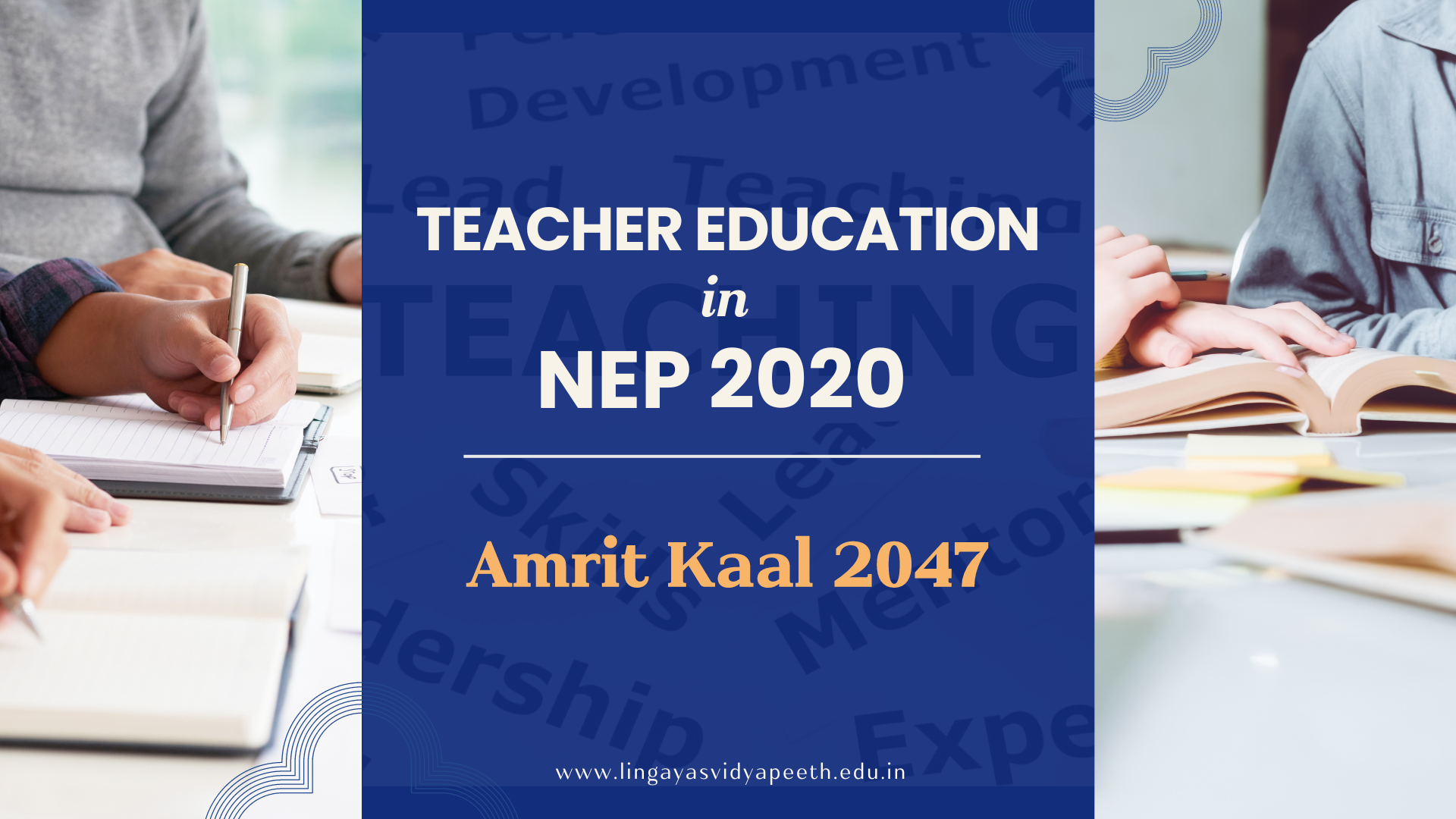Home » Teacher Education in NEP 2020: Amrit Kaal 2047

As we approach Teacher’s Day, it’s opportune to explore the provisions set forth by the National Education Policy 2020 (NEP 2020) aimed at empowering educators as we journey towards the transformative era of Amrit Kaal in 2047.
NEP 2020 mandates the inclusion of a Bachelor of Education (B.Ed.) degree, introducing several changes in Pre-Service Teacher Education. These changes encompass integrated 4-year ITEP programs, 2-year B.Ed. programs for individuals holding Bachelor’s Degrees, and expedited one-year B.Ed. programs for those with equivalent qualifications.
Moreover, the policy advocates for specialized shorter local teacher education programs, along with concise post-B.Ed. certification courses tailored for Special Educators, all of which are accessible through open and distance learning (ODL) platforms. By immersing prospective educators in real classroom environments within their local communities, teachers gain invaluable insights into understanding their student demographic.
Effective Ways to Make Classroom Teaching Innovative
NEP 2020 recognizes India’s linguistic diversity and advocates for multilingualism in teacher training. The policy underscores the importance of educators being proficient in at least two languages, including regional languages. Central to the NEP vision is the integration of the Indian Knowledge System, which serves as a beacon guiding education towards communities. This integration celebrates traditional learning while emphasizing the significance of knowledge across diverse domains such as mathematics, astronomy, philosophy, yoga, architecture, medicine, agriculture, engineering, linguistics, literature, sports, games, governance, and conservation.
In acknowledgment of the evolving nature of the world and education, NEP 2020 introduces Continuous Professional Development (CPD) in teacher training initiatives. Teaching is framed as a lifelong journey of learning, necessitating regular training programs, workshops, and opportunities for educators to remain updated with the latest educational practices, technological advancements, and subject matter expertise.
The collaborative spirit of NEP 2020 is evident in its call for cooperation between central and state governments, education boards, and teacher education institutions. Initiatives like the UGC’s Pandit Madan Mohan Malaviya National Mission on Teachers & Teaching exemplify this collaborative effort.
Student’s Life: Challenges, Opportunities, and Achievements
NEP 2020 emphasizes the utilization of platforms like SWAYAM and DIKSHA to upskill teachers through continuous learning programs. These platforms play a pivotal role in fostering a technologically adept educational environment accessible through ODL.
Introduced in 2021, the National Curriculum Framework for Teacher Education is a cornerstone of NEP 2020. Developed by the National Council of Educational Research and Training (NCTE) under the Ministry of Education’s guidance, this framework offers structured guidelines for teacher education institutions, with a commitment to regular updates every 5-10 years.
NEP 2020 acknowledges scholars as educators and mandates the incorporation of compulsory credit courses focused on teaching within Ph.D. programs. This framework aims to elevate teaching as a specialized field, with dedicated training for leadership and management positions.
In essence, the National Education Policy 2020 paves the way for a dynamic and empowered teaching fraternity, poised to lead the nation towards educational excellence in the transformative era of Amrit Kaal 2047.
From
Dr. Sakshi Sharma
Assistant Professor
School of Education
Lingaya’s Vidyapeeth
Best B.Ed Colleges in Delhi NCR
RECENT POSTS
CATEGORIES
TAGS
Agriculture Agriculture future AI Architecture artificial intelligence Bachelor of Commerce BA English BA Psychology BTech AIML BTech CSE BTech cybersecurity BTech Engineering Business management career Career-Specific Education career guide career option career scope Civil engineering commerce and management Computer Science Computer science engineering Data science degree education Engineering Engineering students English Literature english program Fashion Design Fashion design course Higher Education Journalism journalism and mass communication law Law career Machine Learning mathematics MBA MBA specialization Mechanical Engineering Pharmacy Psychology Research and Development students
Lingaya's Vidyapeeth (LV) only conducts physical/online verification of any document related to examination on the following official email IDs:
It is important to note that the following email IDs and domains are fraudulent and do not belong to our university:
Please do not respond to or share any personal information with these fraudulent sources.